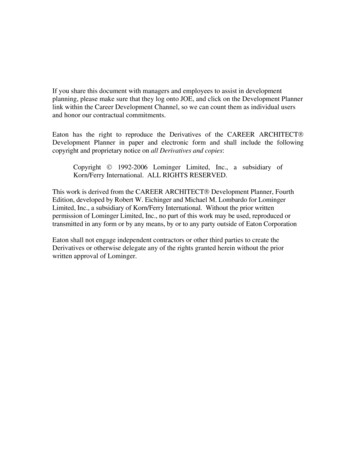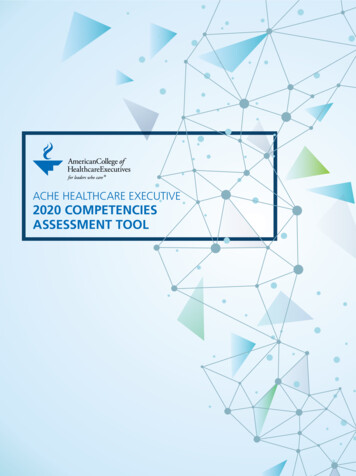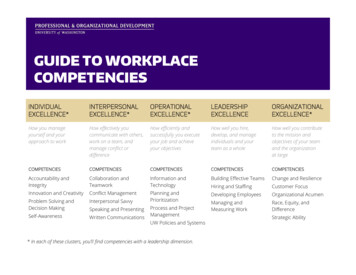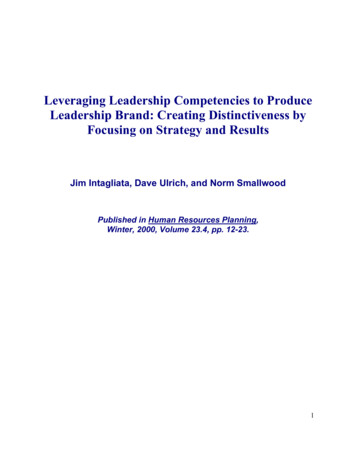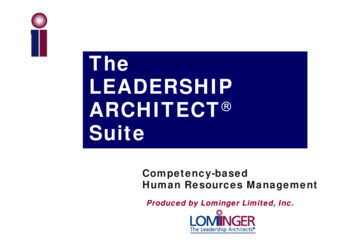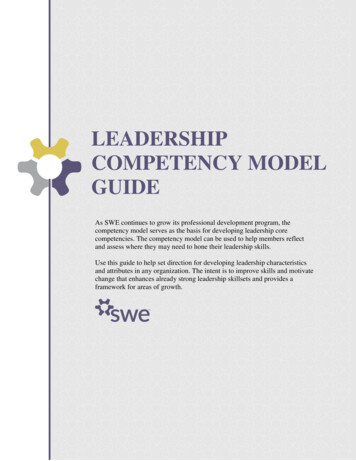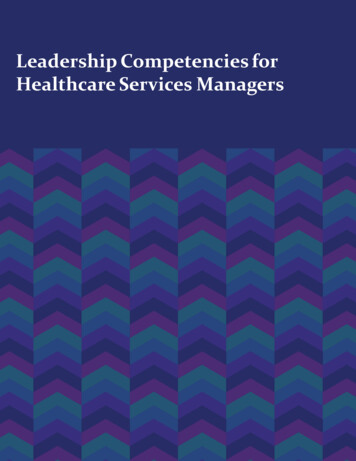
Transcription
Leadership Competencies forHealthcare Services ManagersLeadership Competencies for Health Services Managers1
This document is the result of a global consortium for healthcare management that has work extensivelybetween January 2013 and June 2015.The following organization have participated in the consortium set up by The International Hospital Federation: American College of Healthcare Executives Australasian College of Health Service Management Canadian College of Health Leaders European Association of Hospital Managers Federacao Brasileira de Administradores Hospitalares Federacion Andina y Amazonica de Hospitales Federacion Latinoamericana de Hospitales Health Management Institute of Ireland Hong Kong College of Healthcare Executives International Health Services Group International Hospital Federation Jamaican Association of Health Services Management Sciences for Health Pan American Health Organization Sociedad Chilena de Administradores en Atención Médica y Hospitalaria Taiwan College of Healthcare Managers Tropical Health and Education Trust – Partnership for Global Health University of the West IndiesAll the participants from these institutions have built up a consensus to promote the foundation of healthcaremanagement professionalization supported by universally recognized competencies that will enhance healthcare to the people.In addition more than one hundred healthcare professionals and academics have contributed in the writtenopen review process as well as by providing inputs during the presentations made at several occasions duringthe period 2013-2015. Their contribution is fully recognized and appreciated.This document is covered by an open source copy right. Anyone may copy, distribute or reuse the content of thedocument, as long as the author and original source are properly cited and that no commercial use of it is made.Copyright 2015 by the International Hospital Federation2Leadership Competencies for Health Services Managers
Global Consortium forHealthcare ManagementProfessionalization“The science of medicine is thousands of years old. Thediscipline of management sciences, which includes thestudy of leadership, is less than 100 years old. Themanagement sciences applied to health care are still intheir infancy.”1The leaders of organizations representing government,the private sector, healthcare associations, and academicinstitutions have come together to raise the recognitionof professional management in healthcare, by developinga core competencies directory for healthcare leaders withthe input of a diverse group of multilateral healthcareorganizations. The shared aim of all participants isprofessionalizing the leadership and management ofhealth systems to improve patient care globally.To further promote this shared aim and enhanceleadership and management practices in healthcare,these leaders have created a Global Consortium forHealthcare Management Professionalization2 that isrecognized and supported by International HospitalFederation members.of resources. The professionalization of management ofhealthcare organizations enhances efficiency and helps toensure the best use of limited resources.As the healthcare portion of nations’ GDP continues toincrease, the pressure for enhanced managementcapacity will continue to grow. In addition, as healthcaremanagement is recognized as a profession, people willbe attracted to the profession. The profession will have agreater voice in society and will be increasingly relevant toachieve improved patient and population health outcomes.The evidence is convincing that the efficient and effectiveuse of resources and the quality of healthcare servicesprovided is improved by enhancing the managementcapacity of individual leaders and teams.Yet, healthcare organizations face two key barriers torealizing the benefits of professional management. Thefirst is the lack of adequate management preparation inthe training of many healthcare leaders. The second is thefact that the role of healthcare manager is not recognizedas a profession in all countries.To professionalize healthcare management and producehighly competent managers, the Consortium’s collectivework to date has identified the need to focus on sixcritical areas: accountability and transparency, serviceimprovement, educational standards, integrity, acommitment to share leading practices, and equity inaccess to and delivery of care.The Need for theProfessionalization ofHealthcare ManagementMinistries of health recognize that delivering qualityhealthcare is dependent on the efficient and effective use1Management Sciences for Health “Occasional Papers” NO. 4(2006)2International Hospital Federation, Pan American HealthOrganization, American College of Healthcare Executives, AustralasianCollege of Health Service Management, Canadian College of HealthLeaders, Taiwan College of Healthcare Managers, Health ManagementInstitute of Ireland, European Association of Hospital Managers,Jamaican Association of Health Services, Management Sciences forHealth, International Health Services Group, THET Partnership for GlobalHealth, Sociedad Chilena de Administradores en Atención Medica yHospitalaria,Federación Andina y Amazónica de Hospitales, FederacionLatinoamericana de Hospitales, University of the West Indies, FederacaoBrasileirade Administradores Hospitalares, Hong Kong College ofHealthcare ExecutivesLeadership Competencies for Health Services ManagersThe Call to ActionThe Global Consortium for Healthcare ManagementProfessionalization is urgently calling on governmentsand the international health community to recognize thathealthcare performance and improvement are significantlydependent on the existence and quality of professionalmanagement of healthcare organizations.Healthcare professionals should: Display ethical, just and equitable behavior at all times Commit to active, lifelong learning of soundmanagement and leadership practices anddemonstrate those management and leadershippractices in the execution of their daily responsibilities3
Serve as a resource for training less-senior healthcaremanagers Commit to improve the health of populations andindividuals Acknowledge healthcare management associations asthe governing bodies in the field, and accept theirrules, regulations and codes of conductThe Consortium also calls for the adoption of the GlobalHealthcare Management Competency Directory asthe initial basis for healthcare management developmentframeworks and programs, for use by academicinstitutions and relevant licensing and accreditingbodies.The Consortium advocates for the formation andstrengthening of professional organizations for healthcaremanagers, which provide the infrastructure for effectivehealthcare management practices to become pervasive,thus improving health outcomes and optimizing resourceutilization. Departments of health at the country level areurged to actively support the development of professionalhealthcare management organizations.The Consortium recognizes that the competencyframework must remain flexible and needs to be adaptedto the specific circumstances of each country. Accordingly,the competencies identified in the directory may beadapted to ensure their relevance in the local context.Recognizing the need for greater progress in the ongoingeffort to build professional healthcare managementcapacity, the members of the Consortium agree that thefollowing measures should be implemented according tonational circumstances and needs: Adoption of the Global Healthcare ManagementCompetency Directory to inform and alignhealthcare management development programs atall levels of undergraduate, postgraduate and ongoingeducation and professional development. Customization and incorporation of each of thecompetency requirements into formal credentialingsystems, which should be based on independentevaluation and evidence of demonstratedcompetencies Formal recognition at the national level of healthcaremanagement as a profession Implementation of merit-based career advancementalong with a career path for healthcare managers andleaders Recognition of healthcare managers’ professionalassociations as key stakeholders for policy dialoguerelated to leadership and management and for theadvancement of the profession4Competency Domains andSub‐domainsThe competencies in the Competency Directory arederived from those in the Healthcare LeadershipAlliance (HLA) Competency Directory.3 The HLAcompetencies were developed from job analysis surveysconducted to determine the relevant tasks typicallyperformed by healthcare managers regardless of worksetting or years of experience. The global competencieshave been validated by the organizations thatcontributed to the Competency Directory and representdocumented skills and abilities of thousands ofhealthcare managers from a variety of settings. TheCompetency Directory may be used to show the depthand breadth of knowledge healthcare managers need toknow to ensure that their organizations and thehealthcare system are operating effectively in providingoptimal care to the population served.Figure 13In addition to the American College of Healthcare Executives,other members of the Healthcare Leadership Alliance (HLA) areAmerican Association for Physician Leadership, American Organizationsof Nurse Executives, Healthcare Financial Management Association,Healthcare Information and Management Systems Society and theMedical Group Management AssociationLeadership Competencies for Health Services Managers
In the Competency Directory, the competencies arecategorized into five critical domains: Leadership,Communication and Relationship Management,Professional and Social Responsibility, Health andHealthcare Environment, and Business. The Definitionsof the domains are as follows:4. Health and the Healthcare Environment1. LeadershipThe ability to apply business principles, including systemsthinking, to the healthcare environment.The ability to inspire individual and organizationalexcellence, create a shared vision and successfully managechange to attain an organization’s strategic ends andsuccessful performance. Leadership intersects with theother four domains.2. Communication and RelationshipManagementThe ability to communicate clearly and concisely withinternal and external customers, establish and maintainrelationships, and facilitate constructive interactions withindividuals and groups.3. Professional and Social ResponsibilityThe understanding of the healthcare system and theenvironment in which healthcare managers and providersfunction.5. BusinessThe Competency Directory can be used in a variety ofways. Figure 2 shows some of the key stakeholders andtheir possible uses of the Competency Directory.Healthcare managers should demonstrate competence in allfive domain areas. As you work your way through theDirectory, the Consortium hopes you will find it valuable onyour path of lifelong professional education. Please share thetool with other healthcare managers, government agencies,academicians and others to help support the internationalrecognition of the healthcare management profession. Formore information on this Directory, contact the InternationalHospital Federation athttp://www.ihf-fih.org/.The ability to align personal and organizational conductwith ethical and professional standards that include aresponsibility to the patient and community, a serviceorientation, and a commitment to lifelong learning andimprovement.Figure 2Work together topositively impactpatient carethroughheightenedleadershipcapability andincreasedrecognition for theprofession ofhealthcaremanagementLeadership Competencies for Health Services Managers5
Global Healthcare Management Competency Directory 1. Leadership Competencies:Demonstrate understanding of the function of mediaand public relationsA. Leadership Skills and BehaviorC. Facilitation and Negotiation Manage conflict through mediation, negotiation andother dispute resolution techniques Demonstrate problem solving and problem-solvingskills Build and participate in effective multidisciplinary teams Articulate and communicate the mission, objectivesand priorities of the organization to internal andexternal entitiesIncorporate management techniques and theories intoleadership activitiesAnalyze problems, promote solutions and encouragedecision makingB. Engaging Culture and Environment Create an organizational climate built on mutual trust,transparency and a focus on service improvement thatencourages teamwork and supports diversity Encourage a high level of commitment from employeesby establishing and communicating a compellingorganizational vision and goals 3. Professional and Social ResponsibilityCompetencies:A. Personal and Professional Accountability Advocate for and participate in healthcare policyinitiatives Advocate for rights and responsibilities of patients andtheir families Demonstrate an ability to understand and manageconflict-of-interest situations as defined byorganizational bylaws, policies and procedures Practice due diligence in carrying outfiduciary responsibilitiesHold self and others accountable to surpassorganizational goalsC. Leading Change Promote ongoing learning and improvement in theorganization Respond to the need for change and lead the changeprocessCommit to competence, integrity, altruism and thepromotion of the public good Promote quality, safety of care and social commitment,in the delivery of health servicesD. Driving Innovation Encourage diversity of thought to support innovation,creativity and improvementB. Professional Development and Lifelong Learning Demonstrate commitment to self-developmentincluding continuing education, networking, reflectionand personal improvement2. Communications and RelationshipManagement Competencies:C. Contributions to the ProfessionA. Relationship Management Contribute to advancing the profession of healthcaremanagement by sharing knowledge and experience Develop others by mentoring, advising, coaching andserving as a role modelSupport and mentor high-potential talent within bothone’s organization and the profession of healthcaremanagement Demonstrate effective interpersonal relationshipsand the ability to develop and maintain positivestakeholder relationships Practice and value transparent shared decision makingand understand its impacts on stakeholders (internaland external) Demonstrate collaborative techniques for engagingand working with stakeholdersD. Self‐Awareness Be aware of one’s own assumptions, values,strengths and limitations Demonstrate reflective leadership by using selfassessment and feedback from others in decisionmakingB. Communication Skills and Engagement Exercise cultural sensitivity in internal and externalcommunication Demonstrate strong listening and communication skills Present results of data analysis in a way that is factual,credible and understandable to the decision makers 6Prepare and deliver business communications such asmeeting agendas, presentations, business reports andproject communication plansE. Ethical Conduct and Social Consciousness Demonstrate high ethical conduct, a commitment totransparency and accountability for one’s actionsLeadership Competencies for Health Services Managers
Use the established ethical structures to resolve ethicalissues Maintain a balance between personal and professionalaccountability, recognizing that the central focus is the needs of the patient/communitycommunicate relevant surveillance information toincrease response to risks, threats, and damage tohealthRecognize the local implications of global health eventsto understand global interconnectivity and its impacton population health conditions3. Health and Healthcare EnvironmentCompetencies:5. Business Competencies:A. Health Systems and OrganizationsA. General Management Demonstrate an understanding of system structure,funding mechanisms and how healthcare services areorganized Demonstrate knowledge of basic business practices,such as business plans, contracting, and projectmanagement Balance the interrelationships among access, quality,safety, cost, resource allocation, accountability, caresetting, community need and professional roles Collate relevant data and information, and analyzeand evaluate this information to support or makean effective decision or recommendation Assess the performance of the organization as part ofthe health system/healthcare services Use monitoring systems to ensure legal, ethical, andquality/safety standards are met in clinical,corporate and administrative functionsSeek information from a variety of sources to supportorganizational performance, conduct needs analysisand prioritize requirements Promote the establishment of alliances andconsolidation of networks to expand social andcommunity participation in health networks, bothnationally and globallyB. Laws and Regulations C. Financial Management Effectively use key accounting principles andfinancial management tools, such as financial plansand measures of performance (e.g., performanceindicators) Use principles of project, operating and capitalbudgeting Plan, organize, execute and monitor the resources ofthe organization to ensure optimal health outcomesand effective quality and cost controlsB. Health Workforce Demonstrate the ability to optimize the healthcareworkforce around local critical workforce issues, suchas shortages, scope of practice, skill mix, licensing andfluctuations in serviceC. Person‐Centered Health Effectively recognize and promote patients and theirfamily’s/caregiver’s perspectives in the delivery of careInclude the perspective of individuals, families andthe community as partners in healthcare decisionmaking processes, respecting cultural differences andexpectationsD. Human Resource Management Provide leadership in defining staff roles andresponsibilities, developing appropriate jobclassification/grading systems and workforce planning Effectively manage departmental human resourceprocesses, including scheduling; performanceappraisals; incentives; staff recruitment; selection andretention; training and education; motivation, coachingand mentoring; and appropriate productivity measuresD. Public Health Establish goals and objectives for improving healthoutcomes that incorporate an understanding of thesocial determinants of health and of thesocioeconomic environment in which the organizationfunctionsAbides by laws and regulations applicable to the workof the organizationE. Organizational Dynamics and Governance Use vital statistics and core health indicators to guidedecision making and analyze health trends of thepopulation to guide the provision of health servicesDemonstrate knowledge of governmental, regulatory,professional and accreditation agencies Effectively apply knowledge of organizational systemstheories and behaviors Manage risks, threats, and damage to health duringdisasters and/or emergency situations Interpret public policy, legislative and advocacyprocesses within the organization Evaluate critical processes connected with thepublic health surveillance and controls systems and Leadership Competencies for Health Services Managers7
Manage within the governance structure of theorganization Create and maintain a system of governance thatensures appropriate oversight of the organization Demonstrate knowledge of the role of leadershipwithin governance structure K. Supply Chain Management Effectively manage the supply chain to achievetimelines and efficiency of inputs, materials,warehousing, and distribution so that supplies reachthe end user in a cost-effective manner Adhere to procurement regulations in terms ofcontract management and tendering guidelines Effectively manage the interdependency and logisticsof supply chain services within the organizationF. Strategic Planning and Marketing Lead the development of key planning documents,including strategic plans, business service plans andbusiness cases for new services Plan for business continuity in the face of potentialdisasters that could disrupt service delivery Develop and monitor operating-unit strategicobjectives that are aligned with the mission andstrategic objectives Apply marketing principles and tools to developappropriate marketing to the needs of the community Evaluate whether a proposed action aligns with theorganizational business/strategic planConnect the interrelationships among access,quality, cost, resource allocation, accountability andcommunity needG. Information Management Use data sets to assess performance, establish targets,monitor indicators and trends, and determine ifdeliverables are met Ensure that applicable privacy and securityrequirements are upheld Ensure optimal use of information and trend analysiswithin the organization through the use of businessintelligence, information management, clinical, andbusiness systems Promote the effective management, analysis andcommunication of health informationH. Risk Management Effectively use risk management principles andprograms, such as risk assessment and analysis and riskmitigationI. Quality Improvement Develop and implement quality assurance, satisfaction,and patient safety programs according to nationalinitiatives on quality and patient safety Develop and track indicators to measure qualityoutcomes, satisfaction and patient safety, and plancontinuous improvementJ. Systems Thinking 8Demonstrate an understanding of theinterdependency, integration, and competition amonghealthcare sectorsLeadership Competencies for Health Services Managers
Leadership Competencies for Health Services Managers9
Appendix: History andProcess ofCollaboration1. Work has been accomplished within individual countries on identifying needed competencies for healthcare leaders. In the United States, the Associationof University Programs in Health Administration andthe Commission on Accreditation of Healthcare Management Education have been leaders in identifyingcompetencies and developing healthcare executivesfrom a University education perspective. In the UnitedKingdom, the Institute of Healthcare Management andthe London School of Economics have been working topromote the profession of healthcare managementand support individual healthcare managers. Canada’sand Australia’s initiatives have supported thedevelopment of healthcare leaders. As these examplesshow, the Global Consortium for HealthcareManagement Professionalization is not the only entityworking to make a difference in this field. However theConsortium is uniquely positioned to make a globalcontribution to identifying needed competencies forhealthcare leaders as a result of its internationalmakeup. The variety of efforts that are currently underway also show that there is a growing recognition ofthe importance and urgency to identify neededcompetencies for healthcare leaders on a global scale.Australasian College of Health Service Management,the United Kingdom’s competency model developedby the National Health Service and the Regional CoreCompetency Framework for Public Health, and theemerging countries competency model developed byManagement Sciences for Health for USAID.4. The Consortium was established to supportprofessionalizing healthcare management and toenhance training for healthcare leaders by: creating an internationally agreed-upon set of corecompetencies for healthcare managers, encouraging the use of this framework as a tool tointensify the training, employment and promotion of healthcare managers, promoting the development of long-term careerpathways for healthcare managers, promoting peer control and development ofhealthcare managers through the formalization andacceptance of healthcare management associationswithin countries and regions.5. The first in-person meeting was hosted by the PanAmerican Health Organization (PAHO) in WashingtonDC, in January 2013. The focus of this meeting was toachieve agreement on fundamental competenciesneeded for healthcare service executives, the targetaudience for the framework; the appropriate range ofcompetencies; and how and by whom thecompetencies should be assessed. In March, 2013, theConsortium adopted its guiding principles, and in May,2013 the members agreed on an initial competencyframework. The Consortium was then formalized andthe initiative was launched in June, 2013. The secondhalf of 2013 was spent validating the initial version ofthe Competency Directory. In November andDecember 2013, a survey was sent to experts in avariety of healthcare management settings and inlocations throughout the world, who reviewed theDirectory and gave feedback.2. Despite the benefits, challenges persist in professionalizing healthcare management. Less fragmentation inaddressing this issue is needed, and the case forsupport requires a more objective presentation of thebenefits. Governments are encouraged to recognizethe potential impact of professionalizing healthcaremanagement and the need for urgency in achieving this6. In January 2014, a second meeting was hosted byobjective. As nations strive to address the issues ofPAHO in Washington, DC, to review the survey resultsoutcomes, access, resources, globalization andand create an updated version of the Competencycomplexity, the objective of professional healthcareDirectory. The focus of this second meeting was tomanagement will be increasingly pressing.utilize the diverse perspectives of 22 individuals from3. The work of the Consortium began in 2012 with a15 countries to work together to gain consensus oncross- walk of current healthcare managementthe key competencies needed for healthcare execucompetency frameworks from around the world.tives from a larger directory framework of more thanThese competency models include: USA’s Healthcare300 statements. The Consortium worked to finalize andLeadership Alliance competency model, Canada’svalidate a list of competencies and to ensure theLEADS leadership framework supported by thecompetency model is applicable to healthcare leadersCanadian College of Health Leaders and the LEADSon a global level.Collaborative partnership, Australia’s competencymodel developed by Health Workforce Australia andsupported by the10Leadership Competencies for Health Services Managers
7. In January 2015, a third meeting was hosted by PAHOin Washington, DC to review the updated CompetencyDirectory, move forward with the call to action anddevelop a communication plan. The CompetencyDirectory was approved by the Consortium, which wasrenamed the Global Consortium for HealthcareManagement Professionalization.8. The Competency Directory resulted from consensusbuilding among the largest possible representation ofhealthcare management associations and groups in theworld. It is a cornerstone for enhancing the professionalization of healthcare managers. It will serve asa universal reference that can be customized in eachcountry to advance the credentials of healthcareleaders.9. The Competency Directory is a first step of anambitious initiative to professionalize healthcaremanagement, and therefore the Global Consortiumfor Healthcare Management Professionalization isputting forward a call to action to further mobilize allkey stakeholders in the health arena.Leadership Competencies for Health Services Managers11
American College of Healthcare ExecutivesAustralasian College of Health Service ManagementCanadian College of Health LeadersEuropean Association of Hospital ManagersFederacao Brasileira de Administradores HospitalaresFederacion Andina y Amazonica de HospitalesFederacion Latinoamericana de HospitalesHealth Management Institute of IrelandHong Kong College of Healthcare ExecutivesInternational Health Services GroupInternational Hospital FederationJamaican Association of Health ServicesManagement Sciences for HealthPan American Health OrganizationSociedad Chilena de Administradores en Atención Médica yHospitalariaTaiwan College of Healthcare ManagersTropical Health and Education Trust – Partnership for Global HealthUniversity of the West Indies12Leadership Competencies for Health Services Managers
Leadership Competencies for Health Services Managers 3 Global Consortium for Healthcare Management Professionalization “The science of medicine is thousands of years old. The discipline of management sciences, which includes the study of leadership, is less than 100 years old. The managem
